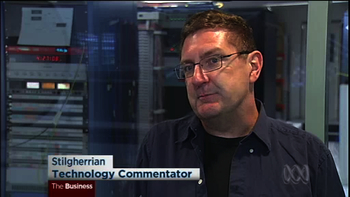 I am somewhat pleased to be a finalist in two categories of the Optus IT Journalism Awards, often called “The Lizzies” because the awards take the form of a lizard — or at least they used to.
I am somewhat pleased to be a finalist in two categories of the Optus IT Journalism Awards, often called “The Lizzies” because the awards take the form of a lizard — or at least they used to.
Mind you, I’m not all that hopeful of winning.
In the category “Best Columnist”, I’m up against the redoubtable David Braue, who’s won before — as well as Adam Turner, Alex Kidman, Angus Kidman, Ashton Mills, Brett Winterford, John Davidson, Josh Taylor and Luke Hopewell.
My entry had to include four written pieces, so I chose these, all from my ZDNet Australia column, The Full Tilt:
- Influence, vanity metrics and other internet astrology, ZDNet Australia, 14 February 2013.
- Pay heed to the internet’s Third Wave Cows of Disruption, ZDNet Australia, 19 September 2013.
- Microsoft sucked into ever-growing NSA vortex: who’s next?, ZDNet Australia, 13 July 2013.
- Berners-Lee, Silicon Valley, and Australia’s cultural cringe, ZDNet Australia, 7 February 2013.
And in the category “Best Audio Program”, my podcast Corrupted Nerds is up against Marc Fennell’s Download This Show, which won last year, and Patrick Gray’s Risky Business, which has won several times before that — as well as ABC Radio National’s Future Tense, Gadget Grill, Naked Geeks, Tech Daily with Andy Wells, and Technology Tuesday with Angus Kidman (which I’ve had to link to with a Google search because there doesn’t seem to be a separate feed for it).
My entry had to include one episode, so I chose Conversations 4: Will the cloud run out of steam?
Click through for the full list of finalists. The winners will be announced at a booze-addled event next Friday night, 9 May 2014.
[Update 11 May 2014: I didn’t win either of these categories. As expected, Marc Fennell’s Download This Show won Best Audio Program, and ZDNet Australia senior journalist Josh Taylor won best columnist. I’ll post the full list of winners once the official version becomes available, but until then here’s Angus Kidman’s unofficial list.]

 A strange thing happened yesterday. A distributed denial service (DDoS) attack, a big one, got reported in the mainstream media as having somehow all but crippled the internet — despite all the journalists presumably continuing to use the internet as usual.
A strange thing happened yesterday. A distributed denial service (DDoS) attack, a big one, got reported in the mainstream media as having somehow all but crippled the internet — despite all the journalists presumably continuing to use the internet as usual.
